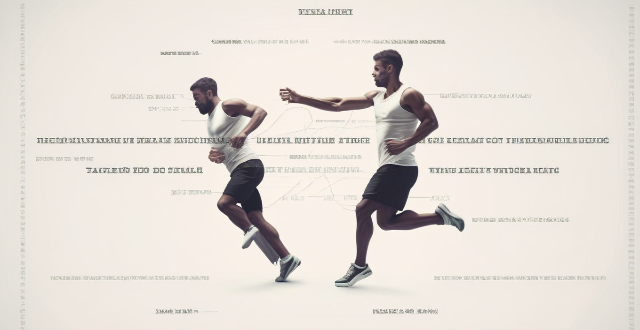The text discusses the role of mental training in enhancing sports skills. It outlines key points including mental toughness, visualization techniques, goal setting, self-talk, and concentration skills. Mental toughness helps athletes handle pressure, recover from setbacks, and persist through challenges. Visualization techniques can program the subconscious, reduce anxiety, and increase motivation. Goal setting clarifies objectives, tracks progress, and maintains motivation. Positive self-talk boosts confidence, enhances performance, and regulates emotions. Concentration skills block distractions, maintain attention, and improve decision making. The conclusion states that mental training is an essential component of overall athletic success.

The Role of Mental Training in Enhancing Sports Skills
Key Points:
- Mental Toughness: Developing the ability to stay focused and resilient under pressure.
- Visualization Techniques: Imagining successful outcomes to enhance performance.
- Goal Setting: Establishing clear objectives for improvement and achievement.
- Self-Talk: Using positive affirmations to boost confidence and motivation.
- Concentration Skills: Learning to block out distractions and maintain focus on the task at hand.
Mental Toughness
Mental toughness refers to an athlete's capacity to perform consistently well despite distractions, adversity, or stress. This aspect of mental training is crucial for athletes because it allows them to:
- Handle Pressure Situations: Maintain composure during critical moments of competition.
- Recover from Setbacks: Quickly overcome errors or poor performances.
- Persist Through Challenges: Continue pushing even when physical fatigue sets in.
Visualization Techniques
Visualization involves creating a mental image of achieving a goal. By practicing visualization, athletes can:
- Program the Subconscious: Ingrain successful actions into muscle memory.
- Reduce Anxiety: Feel more relaxed and prepared before an event.
- Increase Motivation: See their progress towards their goals, which fuels further dedication.
Goal Setting
Setting specific, measurable, attainable, relevant, and time-bound (SMART) goals helps athletes:
- Clarify Objectives: Know exactly what they are working towards.
- Track Progress: Monitor improvements and adjust strategies accordingly.
- Stay Motivated: Achieve smaller milestones that lead to the ultimate goal.
Self-Talk
Athletes often engage in internal dialogues that can be either constructive or destructive. Positive self-talk can:
- Boost Confidence: Reinforce belief in one's abilities and skills.
- Enhance Performance: Encourage better execution by focusing on strengths.
- Regulate Emotions: Control nerves and turn negative thoughts into positive actions.
Concentration Skills
Being able to concentrate fully on the task at hand is vital for peak performance. Concentration skills help athletes to:
- Block Distractions: Ignore external factors that might interfere with focus.
- Maintain Attention: Keep attention on the current play or movement.
- Improve Decision Making: React quickly and accurately based on the situation at hand.
Conclusion:
The integration of mental training into an athlete's regimen significantly impacts the development of sports skills. By strengthening mental attributes such as toughness, visualization, goal setting, self-talk, and concentration, athletes can elevate their physical capabilities to new heights. Mental training is not just a supplement to physical practice; it is an essential component of overall athletic success.